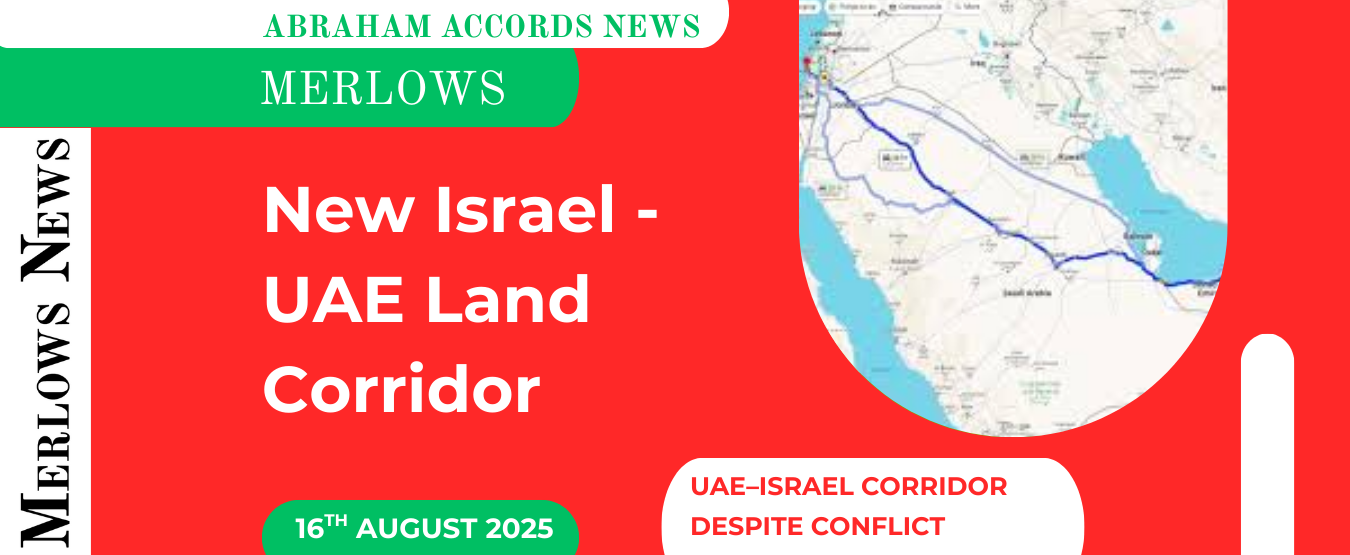A new trade corridor links Gulf ports to Israel by land, slashing costs and boosting commerce. The press calls it “minor.” In truth, it’s revolutionary.
While Western elites wallow in bureaucracy, the Middle East builds highways of peace. The UAE Israel corridor is a quiet triumph of the Abraham Accords.
The Background
The UAE Israel land corridor, launched in 2023, has quietly expanded into one of the most practical successes of the Abraham Accords. Trucks now move goods from UAE ports through Saudi Arabia and Jordan into Israel, bypassing congested sea routes and cutting delivery times dramatically. (Wikipedia UAE–Israel land corridor)
While conflict rages elsewhere, this corridor proves peace through trade is real. It reduces transport costs, opens Gulf markets to Europe via Israel’s Mediterranean ports, and gives Arab and Israeli businesses a concrete incentive to cooperate.
And yet, the Western press barely whispers. The BBC tucked it away as “logistical cooperation.” The Guardian dismissed it as “fragile.” CNN ignored it. But for citizens paying attention, this is history: Arab and Jewish nations building roads, not walls. The media can downplay it but they cannot erase the facts.
History will have its day.
When historians look back on the Abraham Accords, they may not point first to speeches, ceremonies, or summits. They may point to trucks. Specifically, trucks driving from Dubai and Abu Dhabi ports, through Saudi Arabia and Jordan, straight into Israel.
That is the UAE Israel land corridor a quiet triumph of the Accords, now proving that peace through trade is not a slogan but a working model. Goods once forced to navigate the slow, costly Suez Canal now arrive in Israel within days. From there, they move into Europe through Haifa and Ashdod. (Wikipedia)
This isn’t theory. It’s economics. Lower costs. Faster trade. Jobs created. Incentives aligned. Emirati businesses profit, Israeli logistics companies expand, Jordanian and Saudi roads are modernised. Commerce does what politics never could: it binds nations together with contracts, not conflict.
The Guardian (July 2025):
“Trade routes remain vulnerable to political volatility.” Vulnerable? They’ve already survived wars, protests, and media sneers.
Source: The Guardian, July 2025
The Mainstream Media View
And yet, where is the coverage? The BBC described it blandly as “logistical cooperation.” The Guardian waved it off as “fragile, given regional tensions.” The Telegraph buried it beneath speculation about “geopolitical risks.” CNN? Silence.
BBC:
“The land corridor is an example of logistical cooperation, though fragile given tensions.” Fragile? It’s trucks rolling every day, not theory.
Source: BBC News, July 2025
Why? Because the corridor undermines their cherished narrative. The media class insists that peace is always fragile, that only endless concessions can keep it alive. But here we have proof: strong states making cleareyed deals, and it works.
The Timing is Now
Consider the timing. Even as Israel faces hostile propaganda from the West, the corridor keeps running. Even as Iran tried and failed to destabilise the region, trucks keep moving. The corridor proves that prosperity flows from courage. The UAE and Israel chose reality over ideology and citizens on both sides reap the rewards.
This is the heart of the Abraham Accords: not airy promises, but solid results. And still, elites refuse to celebrate. Because success through strength terrifies them. It shows that their way the way of managed decline and endless negotiation is obsolete.
For Britain, this should be a lesson. While we drown in endless debates about identity and appeasement, others are building prosperity. The question is not whether the Abraham Accords work. The question is whether we have the courage to admit it.
The Merlow View
Two hopes emerge from this corridor. First the unlikely but possible one is that the elites finally admit it. That the BBC, Guardian, and CNN stop sneering long enough to say: here is proof that the Abraham Accords are working.
Second the more rational hope is that ordinary citizens seize the narrative. That they point to the corridor, to the billions in trade, to the flights and the deals, and say: this is what peace looks like. Not theory. Not platitudes. Trucks. Commerce. Families with jobs.
But if we let elites bury this story, the truth will be lost. They will continue to call success fragile and pretend progress doesn’t exist. The Abraham Accords are not fragile they are functioning, expanding, thriving. And that is precisely why the media fears them.
“Reject the media’s silence. Speak out, write, assemble, and demand recognition of what works. The Abraham Accords are proof that strength brings peace.”







Share this: